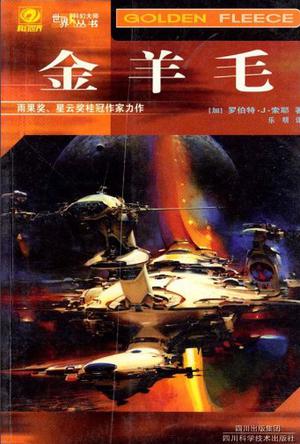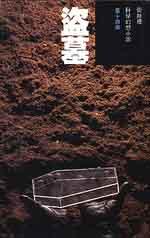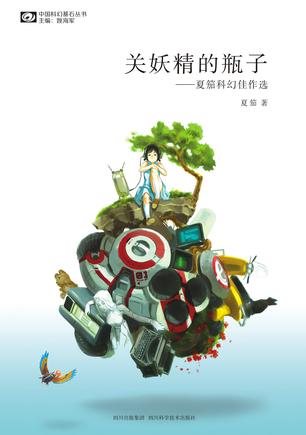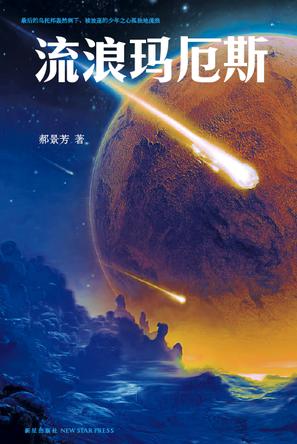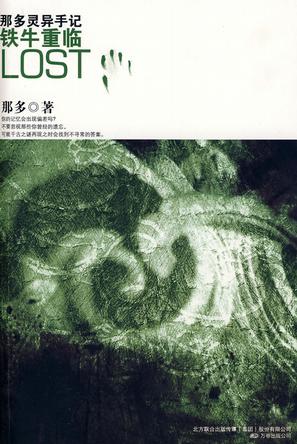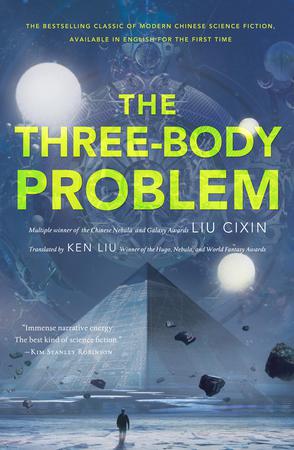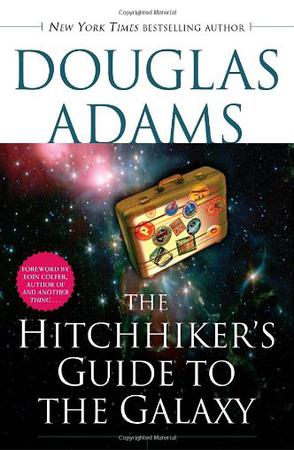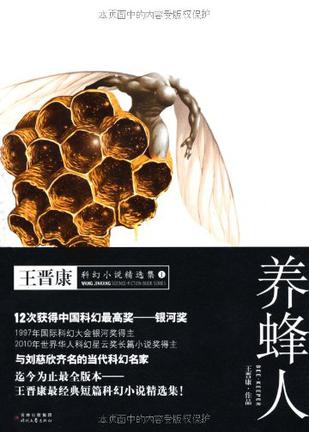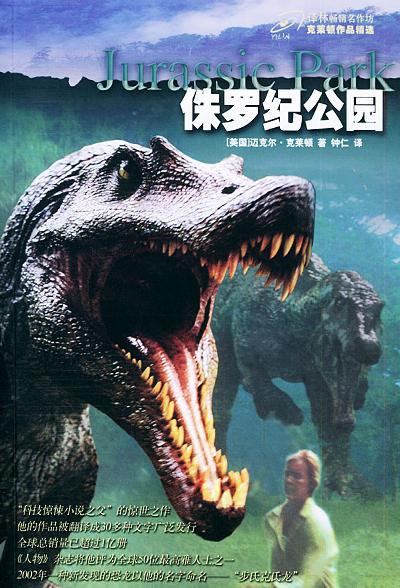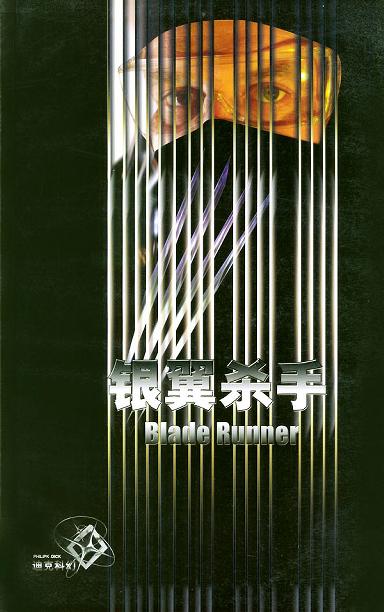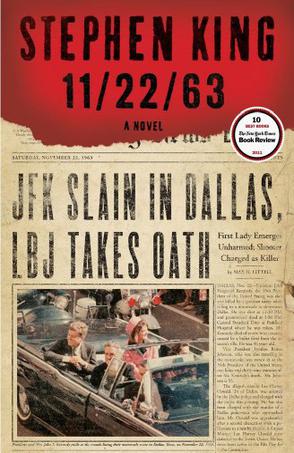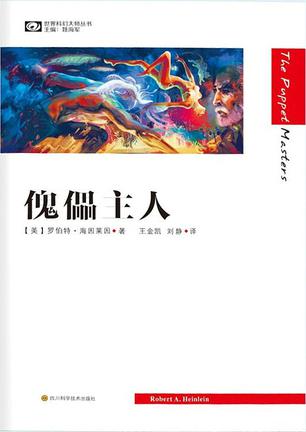欢迎来到相识电子书!
标签:科幻
-
金羊毛
《金羊毛》是一部现代科幻小说。内容叙述我喜欢他们盲目信赖我的感觉。那么如果是在飞船上的夜晚又会怎样呢?几个世纪以来,天文学家们总是在其他人熟睡后才开始他们辛勤的研究工作。 -
盜墓
序--------------------------------------- 「盜墓」這個故事,靈感來自一則新聞,說美國太空總署一個官員,宣稱有不少外星人屍體被發現,列為一級秘密。事實是,有幾個中級官員,神秘失蹤,下落不明,所以才構思了這個故事。 地球人,在觀念上,至今為止,還不夠資格作為宇宙裏的生物──連作為地球生物資格都不夠,為了國與國的界限,這個主義和那個主義的不同,打得難分難解,這樣的低級生物,有甚麼資格把自己提高到宇宙的層次。 一貫地鄙視地球人,是! 衛斯理(倪匡)一九八七、一、十五 --------------------------------------- 三個世界頂尖的盜墓高手,在接受了一個神祕組織的祕密任務之後,三位高手一個失蹤;一個遭後暗殺;剩下的一個又生活在極度恐懼之中。衛斯理幾經追查才發現,他們的任務竟然是去盜屍,然而那些屍体居然是。 -
关妖精的瓶子
这是北大才女(博士)夏笳的第一本科幻小说集。这些作品古灵精怪,意韵隽永,文字时而华丽时而清新,在读者中有“稀饭科幻”的美誉。其中,2004年发表于《科幻世界》的处女作《关妖精的瓶子》一鸣惊人,为夏笳赢得了当年度中国科幻银河奖最佳新人奖,2005年《卡门》获银河奖读者票选奖,2008年《永夏之梦》又为她赢得银河奖优秀奖的殊荣;而获得2011年银河奖读者票选奖的《杀死一个科幻作家》,更是被云南大学DV电视制作班的几个同学用零投资制作成了同名小电影,在土豆网上热播一时。 学物理学院大气科学系。2006年于中国传媒大学攻读电影史论硕士学位,从事科幻电影方面的研究。2010年9月进入北京大学中 夏笳的小说像飞出瓶子的科幻精灵,灵动而充满活力,在色彩缤纷中变幻莫测,具有不可抗拒的魔力。 ——刘慈欣 作为看着夏笳由青涩萝莉成长为宅男女神的历史见证人,深感她笔下清新靡丽细腻的幻想世界令人沉醉。尤其是拜入戴锦华师门之后自觉地理论武装自己,为她具有“稀饭”特色的科幻小说 打开了思想上的广袤宇宙,充斥男性气息的中国科幻,因有了夏笳而更精彩!——陈楸帆 夏笳的文字是流动的灵气,故事轻盈婉转得像一颗透明星球,星雨流转的是细腻的心思和锐利的生命力。 ——小姬 -
濒死的地球
二十亿年后,太阳已走到生命末期,光焰衰微,天空在粉红与深蓝之间变换;地球上文明走到尽头,人烟稀少,魔法与神话重新浮现。曾是万物之灵的人类要么在历史长河中化为尘埃,要么在末世情绪中堕落退化,生活在彼此隔离的中世纪村社里,而他们中的少数魔法师则在工作室里培育生命,在花园里种植有动物血统的混血植物,在黑暗的宴会上召唤神祇…… 万斯运用独特的笔触,勾勒了一个别样的末世,一个“仿佛旧日重现的遥远未来世界”:这里没有高尚的英武悲壮的战争,只有寂寥荒芜中的挣扎求存。 本书由末世故事集《濒死的地球》、《奇人莱尔托》和以“聪明人”库格尔为单一主角的长篇小说《灵界之眼》、《破天之光》组成。 -
流浪玛厄斯
这是最后的乌托邦瓦解的故事。 一百年后的人类,进入两个分化的世界。一端是一切共享的火星,一端是完全交易的地球。相互对峙,互不来往。 有一群少年,在一个世界出生,在另一个世界长大。他们十三岁留学到地球,十八岁回归到火星。 他们出生的世界是规则严明的大厦,长大的世界是散乱芜杂的花园;一个世界是肃穆宏伟的 蓝图,另一个世界是享乐放荡的狂欢。两个世界在他们生命中一前一后到来,不征求意见,也不考虑感受,只在命运的链条上依次降临,以不可阻挡的冷静席卷他们的一生。 大厦中建起的,花园中被打碎;狂欢里忘记的,蓝图还记得。只在大厦里生活的,没有那破灭;只在狂欢里生活的,没有那幻景。只有经历了两个世界的转换的少年,才能在一夜间看到暴雨将至,远景消失,荒地里生出大片奇诡的花。 他们因此沉默,接受各方指责。他们可能是几千年流放者历史中最年少的一群,在不了解命运的年纪被抛入命运,在对另一个世界还茫然无知的时候就被另一个世界裹挟。他们的流放从家园开始,历史的方向他们无从选择。 故事的开始是这群少年归家的时刻。身的远行在那一刻结束,心的流放却要从那一刻开始。 景芳所创造的世界是绝无仅有的——温馨的阳光中沐浴着金属的质感,唯美典雅的意境中贯穿着对两个世界深刻的思考,在宁静的理性中洋溢着理想主义的激情,带我们去八千万公里外经历另一种奇妙的人生。从那个火星红色沙漠上晶莹剔透的世界归来后,你以后的梦境将从黑白变成彩色——这是科幻所能描绘的最壮美的色彩。 ——《三体》作者刘慈欣 -
铁牛重临
都江堰鱼嘴在元朝时代是铁牛与铁乌龟,如今不知所终。据说元代治水专家曾用6万斤铁铸成了两只头部相并、屋部分开的铁乌龟用做鱼嘴,明代还用1万多斤铁铸了一只铁牛用做鱼嘴。但后来铁牛和铁乌龟都都被江水冲走了。1990年枯水期时,都江堰文物管理局邀请了相关专家到都江堰内江等地勘探铁牛、铁乌龟的方位。专家的勘探器所到之处,仪器若出现红色的信号,即表示此处有金属存在,但经勘探却没有发现铁牛、铁龟。铁牛和铁龟的去向成了千古之谜。在寻找都江堰中明代铸造的铁牛时,技术人员林翠却迷失了自己。她身在此世,其记忆和言行却仿佛来自另一个世界。那么原来的林翠哪里去了,会有不同的可能世界、不同的林翠吗?如果一个她突然变成了另一个世界的林翠,那多某一天也需要找回原来的自己吗? -
The Three-Body Problem
Three-Body Problem is the first chance for English-speaking readers to experience this multiple award winning phenomenon from China’s most beloved science fiction author, Liu Cixin. Set against the backdrop of China’s Cultural Revolution, a secret military project sends signals into space to establish contact with aliens. An alien civilization on the brink of destruction captures the signal and plans to invade Earth. Meanwhile, on Earth, different camps start forming, planning to either welcome the superior beings and help them take over a world seen as corrupt, or to fight against the invasion. The result is a science fiction masterpiece of enormous scope and vision. ___________________________________________________________________________Excerpt. © Reprinted by permission. All rights reserved. 1 The Madness Years China, 1967 The Red Union had been attacking the headquarters of the April Twenty-eighth Brigade for two days. Their red flags fluttered restlessly around the brigade building like flames yearning for firewood. The Red Union commander was anxious, though not because of the defenders he faced. The more than two hundred Red Guards of the April Twenty-eighth Brigade were mere greenhorns compared with the veteran Red Guards of the Red Union, which was formed at the start of the Great Proletarian Cultural Revolution in early 1966. The Red Union had been tempered by the tumultuous experience of revolutionary tours around the country and seeing Chairman Mao in the great rallies in Tiananmen Square. But the commander was afraid of the dozen or so iron stoves inside the building, filled with explosives and connected to each other by electric detonators. He couldn’t see them, but he could feel their presence like iron sensing the pull of a nearby magnet. If a defender flipped the switch, revolutionaries and counter-revolutionaries alike would all die in one giant ball of fire. And the young Red Guards of the April Twenty-eighth Brigade were indeed capable of such madness. Compared with the weathered men and women of the first generation of Red Guards, the new rebels were a pack of wolves on hot coals, crazier than crazy. The slender figure of a beautiful young girl emerged at the top of the building, waving the giant red banner of the April Twenty-eighth Brigade. Her appearance was greeted immediately by a cacophony of gunshots. The weapons attacking her were a diverse mix: antiques such as American carbines, Czech-style machine guns, Japanese Type-38 rifles; newer weapons such as standard-issue People’s Liberation Army rifles and submachine guns, stolen from the PLA after the publication of the “August Editorial”1; and even a few Chinese dadao swords and spears. Together, they formed a condensed version of modern history. Numerous members of the April Twenty-eighth Brigade had engaged in similar displays before. They’d stand on top of the building, wave a flag, shout slogans through megaphones, and scatter flyers at the attackers below. Every time, the courageous man or woman had been able to retreat safely from the hailstorm of bullets and earn glory for their valor. The new girl clearly thought she’d be just as lucky. She waved the battle banner as though brandishing her burning youth, trusting that the enemy would be burnt to ashes in the revolutionary flames, imagining that an ideal world would be born tomorrow from the ardor and zeal coursing through her blood.… She was intoxicated by her brilliant, crimson dream until a bullet pierced her chest. Her fifteen-year-old body was so soft that the bullet hardly slowed down as it passed through it and whistled in the air behind her. The young Red Guard tumbled down along with her flag, her light form descending even more slowly than the piece of red fabric, like a little bird unwilling to leave the sky. The Red Union warriors shouted in joy. A few rushed to the foot of the building, tore away the battle banner of the April Twenty-eighth Brigade, and seized the slender, lifeless body. They raised their trophy overhead and flaunted it for a while before tossing it toward the top of the metal gate of the compound. Most of the gate’s metal bars, capped with sharp tips, had been pulled down at the beginning of the factional civil wars to be used as spears, but two still remained. As their sharp tips caught the girl, life seemed to return momentarily to her body. The Red Guards backed up some distance and began to use the impaled body for target practice. For her, the dense storm of bullets was now no different from a gentle rain, as she could no longer feel anything. From time to time, her vinelike arms jerked across her body softly, as though she were flicking off drops of rain. And then half of her young head was blown away, and only a single, beautiful eye remained to stare at the blue sky of 1967. There was no pain in that gaze, only solidified devotion and yearning. And yet, compared to some others, she was fortunate. At least she died in the throes of passionately sacrificing herself for an ideal. * * * Battles like this one raged across Beijing like a multitude of CPUs working in parallel, their combined output, the Cultural Revolution. A flood of madness drowned the city and seeped into every nook and cranny. At the edge of the city, on the exercise grounds of Tsinghua University, a mass “struggle session” attended by thousands had been going on for nearly two hours. This was a public rally intended to humiliate and break down the enemies of the revolution through verbal and physical abuse until they confessed to their crimes before the crowd. As the revolutionaries had splintered into numerous factions, opposing forces everywhere engaged in complex maneuvers and contests. Within the university, intense conflicts erupted between the Red Guards, the Cultural Revolution Working Group, the Workers’ Propaganda Team, and the Military Propaganda Team. And each faction divided into new rebel groups from time to time, each based on different backgrounds and agendas, leading to even more ruthless fighting. But for this mass struggle session, the victims were the reactionary bourgeois academic authorities. These were the enemies of every faction, and they had no choice but to endure cruel attacks from every side. Compared to other “Monsters and Demons,”2 reactionary academic authorities were special: During the earliest struggle sessions, they had been both arrogant and stubborn. That was also the stage in which they had died in the largest numbers. Over a period of forty days, in Beijing alone, more than seventeen hundred victims of struggle sessions were beaten to death. Many others picked an easier path to avoid the madness: Lao She, Wu Han, Jian Bozan, Fu Lei, Zhao Jiuzhang, Yi Qun, Wen Jie, Hai Mo, and other once-respected intellectuals had all chosen to end their lives.3 Those who survived that initial period gradually became numb as the ruthless struggle sessions continued. The protective mental shell helped them avoid total breakdown. They often seemed to be half asleep during the sessions and would only startle awake when someone screamed in their faces to make them mechanically recite their confessions, already repeated countless times. Then, some of them entered a third stage. The constant, unceasing struggle sessions injected vivid political images into their consciousness like mercury, until their minds, erected upon knowledge and rationality, collapsed under the assault. They began to really believe that they were guilty, to see how they had harmed the great cause of the revolution. They cried, and their repentance was far deeper and more sincere than that of those Monsters and Demons who were not intellectuals. For the Red Guards, heaping abuse upon victims in those two latter mental stages was utterly boring. Only those Monsters and Demons who were still in the initial stage could give their overstimulated brains the thrill they craved, like the red cape of the matador. But such desirable victims had grown scarce. In Tsinghua there was probably only one left. Because he was so rare, he was reserved for the very end of the struggle session. Ye Zhetai had survived the Cultural Revolution so far, but he remained in the first mental stage. He refused to repent, to kill himself, or to become numb. When this physics professor walked onto the stage in front of the crowd, his expression clearly said: Let the cross I bear be even heavier. The Red Guards did indeed have him carry a burden, but it wasn’t a cross. Other victims wore tall hats made from bamboo frames, but his was welded from thick steel bars. And the plaque he wore around his neck wasn’t wooden, like the others, but an iron door taken from a laboratory oven. His name was written on the door in striking black characters, and two red diagonals were drawn across them in a large X. Twice the number of Red Guards used for other victims escorted Ye onto the stage: two men and four women. The two young men strode with confidence and purpose, the very image of mature Bolshevik youths. They were both fourth-year students4 majoring in theoretical physics, and Ye was their professor. The women, really girls, were much younger, second-year students from the junior high school attached to the university.5 Dressed in military uniforms and equipped with bandoliers, they exuded youthful vigor and surrounded Ye Zhetai like four green flames. His appearance excited the crowd. The shouting of slogans, which had slackened a bit, now picked up with renewed force and drowned out everything else like a resurgent tide. After waiting patiently for the noise to subside, one of the male Red Guards turned to the victim. “Ye Zhetai, you are an expert in mechanics. You should see how strong the great unified force you’re resisting is. To remain so stubborn will lead only to your death! Today, we will continue the agenda from the last time. There’s no need to waste words. Answer the following question without your typical deceit: Between the years of 1962 and 1965, did you not decide on your own to add relativity to the intro physics course?” “Relativity is part of the fundamental theories of physics,” Ye answered. “How can a basic survey course not teach it?” “You lie!” a female Red Guard by his side shouted. “Einstein is a reactionary academic authority. He would serve any master who dangled money in front of him. He even went to the American Imperialists and helped them build the atom bomb! To develop a revolutionary science, we must overthrow the black banner of capitalism represented by the theory of relativity!” Ye remained silent. Enduring the pain brought by the heavy iron hat and the iron plaque hanging from his neck, he had no energy to answer questions that were not worth answering. Behind him, one of his students also frowned. The girl who had spoken was the most intelligent of the four female Red Guards, and she was clearly prepared, as she had been seen memorizing the struggle session script before coming onstage. But against someone like Ye Zhetai, a few slogans like that were insufficient. The Red Guards decided to bring out the new weapon they had prepared against their teacher. One of them waved to someone offstage. Ye’s wife, physics professor Shao Lin, stood up from the crowd’s front row. She walked onto the stage dressed in an ill-fitting green outfit, clearly intended to imitate the military uniform of the Red Guards. Those who knew her remembered that she had often taught class in an elegant qipao, and her current appearance felt forced and awkward. “Ye Zhetai!” She was clearly unused to such theater, and though she tried to make her voice louder, the effort magnified the tremors in it. “You didn’t think I would stand up and expose you, criticize you? Yes, in the past, I was fooled by you. You covered my eyes with your reactionary view of the world and science! But now I am awake and alert. With the help of the revolutionary youths, I want to stand on the side of the revolution, the side of the people!” She turned to face the crowd. “Comrades, revolutionary youths, revolutionary faculty and staff, we must clearly understand the reactionary nature of Einstein’s theory of relativity. This is most apparent in general relativity: Its static model of the universe negates the dynamic nature of matter. It is anti-dialectical! It treats the universe as limited, which is absolutely a form of reactionary idealism.…” As he listened to his wife’s lecture, Ye allowed himself a wry smile. Lin, I fooled you? Indeed, in my heart you’ve always been a mystery. One time, I praised your genius to your father—he’s lucky to have died early and escaped this catastrophe—and he shook his head, telling me that he did not think you would ever achieve much academically. What he said next turned out to be so important to the second half of my life: “Lin Lin is too smart. To work in fundamental theory, one must be stupid.” In later years, I began to understand his words more and more. Lin, you truly are too smart. Even a few years ago, you could feel the political winds shifting in academia and prepared yourself. For example, when you taught, you changed the names of many physical laws and constants: Ohm’s law you called resistance law, Maxwell’s equations you called electromagnetic equations, Planck’s constant you called the quantum constant.… You explained to your students that all scientific accomplishments resulted from the wisdom of the working masses, and those capitalist academic authorities only stole these fruits and put their names on them. But even so, you couldn’t be accepted by the revolutionary mainstream. Look at you now: You’re not allowed to wear the red armband of the “revolutionary faculty and staff”; you had to come up here empty-handed, without the status to carry a Little Red Book.… You can’t overcome the fault of being born to a prominent family in pre-revolutionary China and of having such famous scholars as parents. But you actually have more to confess about Einstein than I do. In the winter of 1922, Einstein visited Shanghai. Because your father spoke fluent German, he was asked to accompany Einstein on his tour. You told me many times that your father went into physics because of Einstein’s encouragement, and you chose physics because of your father’s influence. So, in a way, Einstein can be said to have indirectly been your teacher. And you once felt so proud and lucky to have such a connection. Later, I found out that your father had told you a white lie. He and Einstein had only one very brief conversation. The morning of November 13, 1922, he accompanied Einstein on a walk along Nanjing Road. Others who went on the walk included Yu Youren, president of Shanghai University, and Cao Gubing, general manager of the newspaper Ta Kung Pao. When they passed a maintenance site in the road bed, Einstein stopped next to a worker who was smashing stones and silently observed this boy with torn clothes and dirty face and hands. He asked your father how much the boy earned each day. After asking the boy, he told Einstein: five cents. This was the only time he spoke with the great scientist who changed the world. There was no discussion of physics, of relativity, only cold, harsh reality. According to your father, Einstein stood there for a long time after hearing the answer, watching the boy’s mechanical movements, not even bothering to smoke his pipe as the embers went out. After your father recounted this memory to me, he sighed and said, “In China, any idea that dared to take flight would only crash back to the ground. The gravity of reality is too strong.” “Lower your head!” one of the male Red Guards shouted. This may actually have been a gesture of mercy from his former student. All victims being struggled against were supposed to lower their heads. If Ye did lower his head, the tall, heavy iron hat would fall off, and if he kept his head lowered, there would be no reason to put it back on him. But Ye refused and held his head high, supporting the heavy weight with his thin neck. “Lower your head, you stubborn reactionary!” One of the girl Red Guards took off her belt and swung it at Ye. The copper belt buckle struck his forehead and left a clear impression that was quickly blurred by oozing blood. He swayed unsteadily for a few moments, then stood straight and firm again. One of the male Red Guards said, “When you taught quantum mechanics, you also mixed in many reactionary ideas.” Then he nodded at Shao Lin, indicating that she should continue. Shao was happy to oblige. She had to keep on talking, otherwise her fragile mind, already hanging on only by a thin thread, would collapse completely. “Ye Zhetai, you cannot deny this charge! You have often lectured students on the reactionary Copenhagen interpretation of quantum mechanics.” “It is, after all, the explanation recognized to be most in line with experimental results.” His tone, so calm and collected, surprised and frightened Shao Lin. “This explanation posits that external observation leads to the collapse of the quantum wave function. This is another expression of reactionary idealism, and it’s indeed the most brazen expression.” “Should philosophy guide experiments, or should experiments guide philosophy?” Ye’s sudden counterattack shocked those leading the struggle session. For a moment they did not know what to do. “Of course it should be the correct philosophy of Marxism that guides scientific experiments!” one of the male Red Guards finally said. “Then that’s equivalent to saying that the correct philosophy falls out of the sky. This is against the idea that the truth emerges from experience. It’s counter to the principles of how Marxism seeks to understand nature.” Shao Lin and the two college student Red Guards had no answer for this. Unlike the Red Guards who were still in junior high school, they couldn’t completely ignore logic. But the four junior high girls had their own revolutionary methods that they believed were invincible. The girl who had hit Ye before took out her belt and whipped Ye again. The other three girls also took off their belts to strike at Ye. With their companion displaying such revolutionary fervor, they had to display even more, or at least the same amount. The two male Red Guards didn’t interfere. If they tried to intervene now, they would be suspected of being insufficiently revolutionary. “You also taught the big bang theory. This is the most reactionary of all scientific theories.” One of the male Red Guards spoke up, trying to change the subject. “Maybe in the future this theory will be disproven. But two great cosmological discoveries of this century—Hubble’s law, and observation of the cosmic microwave background–show that the big bang theory is currently the most plausible explanation for the origin of the universe.” “Lies!” Shao Lin shouted. Then she began a long lecture about the big bang theory, remembering to splice in insightful critiques of the theory’s extremely reactionary nature. But the freshness of the theory attracted the most intelligent of the four girls, who couldn’t help but ask, “Time began with the singularity? So what was there before the singularity?” “Nothing,” Ye said, the way he would answer a question from any curious young person. He turned to look at the girl kindly. With his injuries and the tall iron hat, the motion was very difficult. “No … nothing? That’s reactionary! Completely reactionary!” the frightened girl shouted. She turned to Shao Lin, who gladly came to her aid. “The theory leaves open a place to be filled by God.” Shao nodded at the girl. The young Red Guard, confused by these new thoughts, finally found her footing. She raised her hand, still holding the belt, and pointed at Ye. “You: you’re trying to say that God exists?” “I don’t know.” “What?” “I’m saying I don’t know. If by ‘God’ you mean some kind of superconsciousness outside the universe, I don’t know if it exists or not. Science has given no evidence either way.” Actually, in this nightmarish moment, Ye was leaning toward believing that God did not exist. This extremely reactionary statement caused a commotion in the crowd. Led by one of the Red Guards on stage, another tide of slogan-shouting exploded. “Down with reactionary academic authority Ye Zhetai!” “Down with all reactionary academic authorities!” “Down with all reactionary doctrines!” Once the slogans died down, the girl shouted, “God does not exist. All religions are tools concocted by the ruling class to paralyze the spirit of the people!” “That is a very one-sided view,” Ye said calmly. The young Red Guard, embarrassed and angry, reached the conclusion that, against this dangerous enemy, all talk was useless. She picked up her belt and rushed at Ye, and her three companions followed. Ye was tall, and the four fourteen-year-olds had to swing their belts upward to reach his head, still held high. After a few strikes, the tall iron hat, which had protected him a little, fell off. The continuing barrage of strikes by the metal buckles finally made him fall down. The young Red Guards, encouraged by their success, became even more devoted to this glorious struggle. They were fighting for faith, for ideals. They were intoxicated by the bright light cast on them by history, proud of their own bravery.… Ye’s two students had finally had enough. “The chairman instructed us to ‘rely on eloquence rather than violence’!” They rushed over and pulled the four semicrazed girls off Ye. But it was already too late. The physicist lay quietly on the ground, his eyes still open as blood oozed from his head. The frenzied crowd sank into silence. The only thing that moved was a thin stream of blood. Like a red snake, it slowly meandered across the stage, reached the edge, and dripped onto a chest below. The rhythmic sound made by the blood drops was like the steps of someone walking away. A cackling laugh broke the silence. The sound came from Shao Lin, whose mind had finally broken. The laughter frightened the attendees, who began to leave the struggle session, first in trickles, and then in a flood. The exercise grounds soon emptied, leaving only one young woman below the stage. She was Ye Wenjie, Ye Zhetai’s daughter. As the four girls were taking her father’s life, she had tried to rush onto the stage. But two old university janitors held her down and whispered into her ear that she would lose her own life if she went. The mass struggle session had turned into a scene of madness, and her appearance would only incite more violence. She had screamed and screamed, but she had been drowned out by the frenzied waves of slogans and cheers. When it was finally quiet again, she was no longer capable of making any sound. She stared at her father’s lifeless body, and the thoughts she could not voice dissolved into her blood, where they would stay with her for the rest of her life. After the crowd dispersed, she remained like a stone statue, her body and limbs in the positions they were in when the two old janitors had held her back. After a long time, she finally let her arms down, walked slowly onto the stage, sat next to her father’s body, and held one of his already-cold hands, her eyes staring emptily into the distance. When they finally came to carry away the body, she took something from her pocket and put it into her father’s hand: his pipe. Wenjie quietly left the exercise grounds, empty save for the trash left by the crowd, and headed home. When she reached the foot of the faculty housing apartment building, she heard peals of crazy laughter coming out of the second-floor window of her home. That was the woman she had once called mother. Wenjie turned around, not caring where her feet would carry her. Finally, she found herself at the door of Professor Ruan Wen. Throughout the four years of Wenjie’s college life, Professor Ruan had been her advisor and her closest friend. During the two years after that, when Wenjie had been a graduate student in the Astrophysics Department, and through the subsequent chaos of the Cultural Revolution, Professor Ruan remained her closest confidante, other than her father. Ruan had studied at Cambridge University, and her home had once fascinated Wenjie: refined books, paintings, and records brought back from Europe; a piano; a set of European-style pipes arranged on a delicate wooden stand, some made from Mediterranean briar, some from Turkish meerschaum. Each of them seemed suffused with the wisdom of the man who had once held the bowl in his hand or clamped the stem between his teeth, deep in thought, though Ruan had never mentioned the man’s name. The pipe that had belonged to Wenjie’s father had in fact been a gift from Ruan. This elegant, warm home had once been a safe harbor for Wenjie when she needed to escape the storms of the larger world, but that was before Ruan’s home had been searched and her possessions seized by the Red Guards. Like Wenjie’s father, Ruan had suffered greatly during the Cultural Revolution. During her struggle sessions, the Red Guards had hung a pair of high heels around her neck and streaked her face with lipstick to show how she had lived the corrupt lifestyle of a capitalist. Wenjie pushed open the door to Ruan’s home, and she saw that the chaos left by the Red Guards had been cleaned up: The torn oil paintings had been glued back together and rehung on the walls; the toppled piano had been set upright and wiped clean, though it was broken and could no longer be played; the few books left behind had been put back neatly on the shelf.… Ruan was sitting on the chair before her desk, her eyes closed. Wenjie stood next to Ruan and gently caressed her professor’s forehead, face, and hands—all cold. Wenjie had noticed the empty sleeping pill bottle on the desk as soon as she came in. She stood there for a while, silent. Then she turned and walked away. She could no longer feel grief. She was now like a Geiger counter that had been subjected to too much radiation, no longer capable of giving any reaction, noiselessly displaying a reading of zero. But as she was about to leave Ruan’s home, Wenjie turned around for a final look. She noticed that Professor Ruan had put on makeup. She was wearing a light coat of lipstick and a pair of high heels. Copyright © 2006 by (Liu Cixin) -
The Hitchhiker's Guide to the Galaxy
Don't panic! You're not timetripping! It's the tenth anniversary of the publication of Douglas Adams's zany, best-selling novel, and to celebrate Harmony is reissuing a special edition of this cult classic! By now the story is legendary. Arthur Dent, mild-mannered, out-to-lunch earth-ling, is plucked from his planet by his friend Ford Prefect just seconds before it was demolished to make way for a hyper-space bypass. Ford, posing as an out-of-work actor, is a researcher for the revised edition of The Hitchhiker's Guide to the Galaxy. Together the gruesome twosome begin their now-famous inter-galactic journey through time, space and best-sellerdom. For Hitchhiker fanatics (you know who you are!) who've read the books, seen the television program, and listened to the radio show, as well as newcomers to Douglas Adams's unique universe -- remember -- don't panic, don't forget to bring a towel, and don't forget to celebrate The Hitchhiker's Guide to the Galaxy's tenth anniversary by wearing your bathrobe. From the Hardcover edition. -
多了一个
收录《多了一个》和《不死药》两篇。 -
毛毛星球
杰克·哈洛威是一个自私的人,为了自己的利益出卖女友、罔顾法纪,结果被吊销了律师执照,赶出了地球。如今,他来到距离地球178光年的扎拉23号星球,又在此遇到了两难的选择:一边是高达1兆的巨额财富和权势滔天的商业巨头;一边则是未知的前途和全心仰赖自己的外星生物。一个物种,乃 至一个星球的命运,就在他一念之差。 翻开本书,到178光年外的神秘星球,看人类遭遇完全纯真的外星生灵,有人多自私多凶残,就有人多无私多善良。美国最当红科幻小说家约翰·斯卡尔齐带你去认识一群超萌超可爱的外星生灵,感受一场温暖到落泪的宇宙大爱。 -
养蜂人
《王晋康科幻小说精选集1:养蜂人》主要内容简介:与刘慈欣齐名的当代科幻名家。12次斩获中国科幻最高奖——银河奖。1997年国际科幻大会银河奖得主。2010年世界华人科幻星云奖长篇小说奖得主。迄今为止最全版本-王晋康最经典科幻小说精选集! -
茫点
人,实在很笨,是智力最低的一种生物,甚至连是真是幻这样简单的事,都难以做出判断,实在相当可怜。或许,真或幻,并不是那么重要。人生许多烦恼,正是为了要弄清楚真幻而产生的。 ——倪匡(卫斯理) 一名年轻的精神科医生,带着四面镜子突访卫斯理,请求协助解开谜团。卫斯理起先冷眼旁观,白素主动协助,不料被卷入一桩杀人事件中。另一边,日本棋坛高手突然精神失常,最耐人寻味的是访问过他的作家也一并被关进精神病院! 一些不可测的神秘事情正在酝酿,似乎有一条无形的线将这一切连接起来。 -
鬼子
日本游客铃木遇上中国导游小姐,竟然踉跄而逃。目击这个古怪场面的卫斯理,疑心大起,决定追查真相,更不惜远赴日本揭开铃木的神秘面纱…… 一名神秘女郎,在卫斯理面前离奇死亡。正在疑惑之际。他骇然发现衣袋中多了一个圆环!在警方的协助下,卫斯理查得这个圆环原来是一把具有磁力的钥匙,这把钥匙竟能把他带出地球…… 日本鬼子在南京大屠杀中,究竟杀了多少中国人,准确数字还无法知道。《鬼子》也始终是幻想小说——幻想日本鬼子会对犯下的滔天大罪,表示痛悔! 《环》这个故事,是卫斯理故事中谴责人性相当强烈的一个。设想了一个把人性丑恶部分完全摒弃了的环境,但结果仍然不免是悲剧。 本书收录的正是卫斯理科幻小说中的《鬼子》和《环》这两个故事。 -
狐變
卫斯理和一群朋友在屋中谈天,提到一个宇宙不断在扩大的理论,但因为每一样东西都在扩大,所以没有人能察觉出来。若假设有一个人维持不变,在其他不断扩大的人眼中,他就每天都会缩少。 此时,主人酒博新无故大发脾气,朋友唯有离开,只有卫斯理留下。酒博新说要带卫斯理看一样东西。在书房中,有一具显微镜,卫斯理将眼凑到显微镜上,竟见到一只如细菌大小一样的狐狸。酒博新更说狐狸每天会缩小一半。 -
天外金球
白素在欧洲遇到两名神秘人士,告诉她其宗教领袖被逼逃亡,但由于出走时仓卒,留下了一件象征最高权力的东西。他们请求白素协助,往神宫找回一个神赐的金球。 神宫位于全世界其中一个最神秘的地区之中,全是险峻的山路,而且那地方是一个战场,受到严密的封锁。白素几经艰辛完成任务,归还金球,但宗教领袖竟声称无法如以往从金球得到启示,金球可能是假的。 白素乘飞机回来和卫斯理相聚,怎料竟遇上空难,并发生了《原子空间》的故事。 卫斯理听完白素的冒险经历后,发现一点小小的破绽,两人再往神宫,合作解破天外金球之谜。 -
侏罗纪公园
电影《侏罗纪公园》让全世界迅速燃起一股恐龙热潮,《侏罗纪公园》是该电影的原著中文版。 富翁哈蒙德为牟取暴利,招募顶尖科技人员,利用最新生物工程技术,在哥斯达黎加的一座小岛上培育出各种种恐龙,以此建立一座恐龙乐园,即“侏罗纪公园”。不料在公园开张前夕,里面发生了危机,岛上不断有人被食肉恐龙吞噬,于是人与恐龙展开殊死搏斗,惊险万分,高潮迭起,让人看得血脉贲张,但同时小说也带给人们对科学与伦理的沉重思考。难怪它长居全美畅销书榜冠军位置。 -
银翼杀手
《银翼杀手》讲述2019年的洛杉矶,由哈里森·福特扮演的退休警探授命追查一群受政府通缉的复制人的故事。英国干细胞研究专家斯蒂芬·明格尔(StephenMinger)说,《银翼杀手》是他看过的最好的电影。“整部影片的概念远远地超越了它所处的时代,而故事的命题——我们到底是谁?来自何处?——又是如此亘古而永恒。” -
11/22/63
11/22/63 is a novel by Stephen King about a time traveler who attempts to prevent the assassination of John F. Kennedy which occurred on November 22, 1963 (the date of the novel's title). The novel was announced on the author's official site on March 2, 2011.[1] A short excerpt was released online on June 1, 2011,[2] and another excerpt was published in the October 28, 2011 issue of Entertainment Weekly[3] The novel was published on November 8, 2011,[4] and quickly became a number-one bestseller. It stayed on the list for an additional seventeen weeks. 11/22/63 won the 2011 Los Angeles Times Book Prize for Best Mystery/Thriller and the 2012 International Thriller Writers Award for Best Novel,[5][6] and was nominated for the 2012 British Fantasy Award for Best Novel[7] and the 2012 Locus Award for Best Science Fiction Novel.[8] The novel required deep research to accurately portray the late 1950s and early 1960s.[9] King commented on the amount of research it required, saying "I've never tried to write anything like this before. It was really strange at first, like breaking in a new pair of shoes."[9] The novel's time-travel premise marks it as science fiction, specifically the alternative history subgenre, although the extensive period research undertaken by King, dealing with real-life events and people between 1958 and 1963, gives it a strong feeling of historical fiction. http://en.wikipedia.org/wiki/11/22/63 -
傀儡主人
《世界科幻大师丛书:傀儡主人》讲述了,地球正在遭受外星生命“鼻涕虫”的入侵!它们骑在人类背上,操控人类思想! 这是一场不见硝烟的战争。特工老头子、莱姆和玛丽三人成了消灭鼻涕虫的关键力量。老头子尽一切努力,让政府相信他的判断,以动员全国抵抗鼻涕虫的入侵;莱姆强忍恐惧,自愿被鼻涕虫寄宿,接受老头子的审讯;玛丽则勇敢地追寻痛苦的回忆,只为给鼻涕虫致命一击。 人类前途未卜,世界为之惊慌,只有那些意志顽强的人类精英在与强大的敌人浴血苦战。他们,能否为人类赢得一个光明的未来? -
犀照
衛斯理的好友張堅從南極寄了三塊小冰塊要求化驗,而負責化驗的胡懷玉博士突然之間性情大變,而且行為怪異,難道這些冰塊暗藏著什麼玄機? ---------------------------------------------- 可愛的、令衛斯理有時見到他也不免頭痛的少年溫寶裕,在這個故事中首次出現。「犀照」這個故事,也可以說是「溫寶裕出世記」,像「封神榜」中哪吒出世一樣,從此有了這個性好胡思亂想、常有匪夷所思想法、又膽大妄為、行動完全出格的少年人,在衛斯理故事中翻江倒海,大展拳腳。以後的許多故事,都和他有關,而且環繞著他,又發展出不少別的人物來,都性格鮮明,很可以有點故事在他們身上發展。 這個故事中的胡懷玉博士,是不是真的患了病,還是遭到了不知名生物的侵入?近幾年來,令得人人談虎色變的、破壞人類先天免疫能力的那種病毒,有報導說是從實驗室中不小心「逃」出來的──如果這項報導屬實,那麼胡懷玉的憂慮,就大有道理。 實用科學能解釋的東西太少,所以在許多情形下,需要幻想,在幻想的基礎上,科學能進一步發展;若囿於現在實用科學所能知的,連幻想一下都沒有可能了。 幻想是主,科學是副! 衛斯理(倪匡)一九八七、三、廿九
热门标签
下载排行榜
- 1 梦的解析:最佳译本
- 2 李鸿章全传
- 3 淡定的智慧
- 4 心理操控术
- 5 哈佛口才课
- 6 俗世奇人
- 7 日瓦戈医生
- 8 笑死你的逻辑学
- 9 历史老师没教过的历史
- 10 1分钟和陌生人成为朋友

